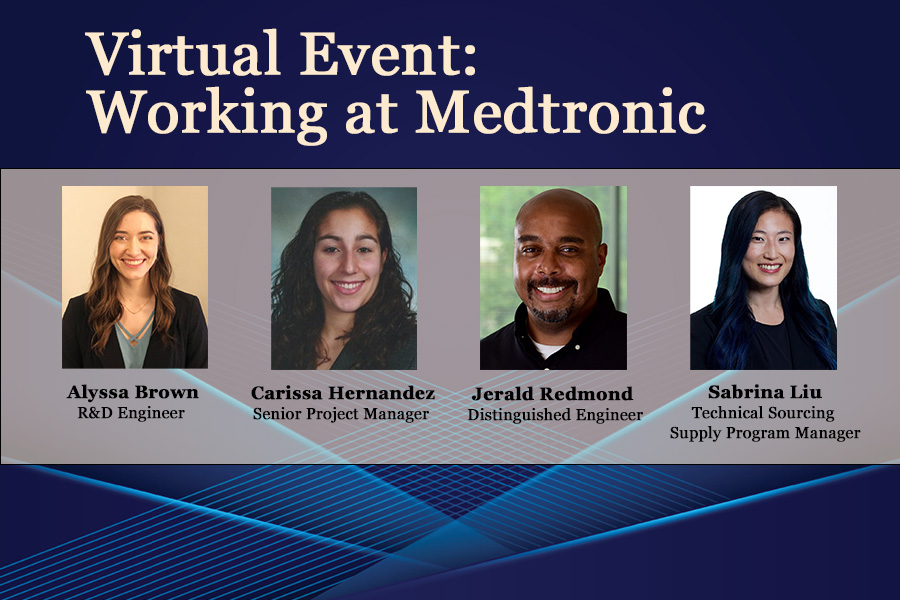
Insights from Medtronic Alumni
By Karina Shevchenko
Last week, the Department of Biomedical Engineering at Carnegie Mellon University (CMU BME) organized an online event with alumni working at Medtronic. The event had the dual goals of helping current students find work at Medtronic while also reconnecting with alumni who are employed there.
During the event, alumni panelists Alyssa Brown, Carissa Hernandez, Sabrina Liu, and Jerald Redmond shared their experiences regarding how their CMU BME degrees prepared them for their respective careers. During the panel session, they addressed questions from the audience and offered insightful recommendations on job searching, resume building, and interview techniques based on their personal journeys.
Sabrina Liu, a Medtronic Technical Sourcing Supply Program Manager with dual CMU degrees in materials science engineering and biomedical engineering, emphasized the significance of soft skills such as critical thinking, problem-solving, teamwork, and time management.
All the panelists highlighted how various programs in the Biomedical Engineering department provided a solid foundation for industry work, particularly through experiences in research, physiology, volunteering in the lab, and CAD training, among others.
Carissa Hernandez, a Medtronic Senior Project Manager with dual CMU degrees in chemical engineering and biomedical engineering, emphasized the value of the Capstone Design Project in simulating real-world problem-solving scenarios.
"You don’t have to know everything; you learn on the job, but BME was helpful in learning and working with other engineers to figure out a problem like in the real world. It’s a good experience to have working with engineers from different backgrounds to achieve the goal," says Hernandez.
Capstone Design classes leverage the unique additional major in Biomedical Engineering at Carnegie Mellon University, integrating students from various traditional majors into teams to foster multidisciplinary collaborative skills.
Jerald Redmond, a Medtronic Distinguished Engineer with master’s and PhD degrees from CMU biomedical engineering, underscored the importance of early career planning, internships, and networking. He emphasized the need to gain industry exposure early on, identify preferences through internships, and network effectively to understand company culture and technology.
"It's often the underlying technology being utilized that determines the skill sets hiring managers seek for a role," emphasizes Redmond.
All panelists agreed that two to three months before graduation is an ideal time to start a job search.
Alyssa Brown, a Medtronic R&D Engineer with dual undergraduate degrees in mechanical engineering and biomedical engineering, and a master’s degree in biomedical engineering, shared her journey from intern to full-time employee at Medtronic. She emphasized the importance of being familiar with the company's mission statement and key products before job interviews.
“Make sure to perform research about the company and its products before the interview. Ask questions and show your genuine interest in the role. This proactive approach can set you apart from other candidates," advises Brown.
All panelists agreed that possessing an engineering mindset, technical background, and the ability to articulate plans and results were essential skills. They highlighted the importance of enthusiasm during interviews, as well as the significance of follow-up thank-you notes to stand out from other candidates.
In conclusion, the panelists stressed that while technical skills are important, the P.I.E. concept, where performance constitutes only 10% of success while image and exposure make up the remaining 90%, is crucial for career advancement.